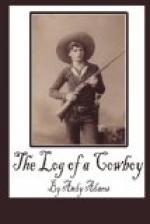After reaching the trail of the missing cattle, our foreman set a pace for five or six miles which would have carried us across the Nueces by nightfall, and we were only checked by Moss Strayhorn riding in on an angle and intercepting us in our headlong gait. The missing cattle were within a mile of us to the right, and we turned and rode to them. Strayhorn explained to us that the cattle had struck some recent fencing on their course, and after following down the fence several miles had encountered an offset, and the angle had held the squad until The Rebel and Blades overtook them. When Officer and he reached them, they were unable to make any accurate count, because of the range cattle amongst them, and they had considered it advisable to save horseflesh, and not cut them until more help was available. When we came up with the cattle, my bunkie and Blades looked wistfully at our saddles, and anticipating their want, I untied my slicker, well remembering the reproof of Quarternight and Forrest, and produced a full canteen of water,—warm of course, but no less welcome.
No sooner were saddles shifted than we held up the bunch, cut out the range cattle, counted, and found we had some three hundred and thirty odd Circle Dots,—our number more than complete. With nothing now missing, Flood took the loose horses and two of the boys with him and returned to the herd, leaving three of us behind to bring in this last contingent of our stampeded cattle. This squad were nearly all large steers, and had run fully twenty miles, before, thanks to an angle in a fence, they had been checked. As our foreman galloped away, leaving us behind, Bob Blades said,—
“Hasn’t the boss got a wiggle on himself today! If he’d made this old world, he’d have made it in half a day, and gone fishing in the afternoon—if his horses had held out.”
We reached the Atascosa shortly after the arrival of the herd, and after holding the cattle on the water for an hour, grazed them the remainder of the evening, for if there was any virtue in their having full stomachs, we wanted to benefit from it. While grazing that evening, we recrossed the trail on an angle, and camped in the most open country we could find, about ten miles below our camp of the night before. Every precaution was taken to prevent a repetition of the run; our best horses were chosen for night duty, as our regular ones were too exhausted; every advantage of elevation for a bed ground was secured, and thus fortified against accident, we went into camp for the night. But the expected never happens on the trail, and the sun arose the next morning over our herd grazing in peace and contentment on the flowery prairies which border on the Atascosa.
CHAPTER V
A DRY DRIVE




